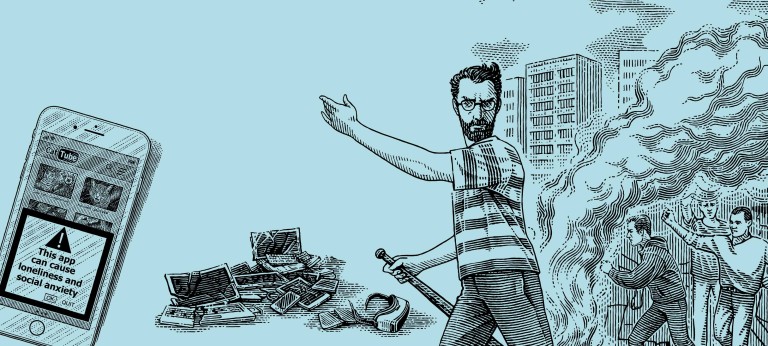On being human
![{[downloads[language].preview]}](https://www.rolandberger.com/publications/publication_image/ta26_human_equation_cover_en_download_preview.jpg)
In this issue of Think:Act magazine we examine in detail what it means to be human in our complex and fast changing world now and in the days to come.


by Fred Schulenburg
illustrations by Tatiana Trikoz
A growing number of digital pioneers are raising their voices and concerns at how tech could be harming us. Have these neo-Luddites got a point, or is their resistance a pointless gesture in the face of advancing technology?
Back in 1779, Ned Ludd, a weaver from the English Midlands, smashed two knitting frames – symbols of a new technology that threatened his job. Or so, at least, runs one account of the story of artisanal backlash against the march of the machines during Britain's industrial revolution. Others recount alternative dates, other forms of vandalism and even someone with a different name. Whatever the truth may be, the "Luddites" did become a historical phenomenon, a proud yet doomed attempt by workers to preserve their livelihoods.
What once promised us a connected world has brought disruption.
Fast-forward two centuries and it appears another pushback against technology is gaining traction. Take, for example, the European Union's recent GDPR directive on data privacy. Then there are the official investigations of social media networks over the abuse of their platforms for political ends. Even tech giant Apple has unveiled features to actually restrain customers from overusing its products and there are broader critiques and concerns about the negative effects of technology on jobs, society, general individual well-being and human relationships. We are now in the midst of a widespread reconsideration of the effects of the rapid and global advance of technology.
A lot of this is captured in a raft of recent books and publications, some from perhaps unexpected sources. Jaron Lanier, one of the pioneers of the internet and a founding father of virtual reality, for example, has just published a book arguing why you should delete your social media accounts; Farhad Manjoo, a tech columnist who writes for "The New York Times", caused a stir with a widely read column about how he went back to print and emerged saner and smarter. They are just two of a growing number of tech aficionados who have started expressing profound doubts about the detrimental personal and societal effects of technology. What once promised us a happy, connected world has brought disruption, unhappiness and a loss of dignity.
"It is like smoking. You have to give up."
So, are we now seeing a return of the Luddites, only this time aiming their anger at the threats posed by artificial intelligence, robots and even the smartphones in our pockets? And if so, what wider effects will it have – and how might policymakers and the industry respond? Among those who believe the backlash is already well and truly underway is Jamie Bartlett, director of the Centre for Analysis of Social Media at the London-based think tank Demos, who has written and broadcast extensively on the effects of tech. He believes that 2018 may be the year of the neo-Luddites. To support his case, he describes a spectrum that ranges from anecdotal evidence of a rejection of technology – for example, people routinely taking time off from devices – at one end, to individual acts of violence against tech entities in France at the other. The latter may only just be a start. Looking to the near future, Bartlett wonders about the response to self-driving vehicles, trucks in particular. "The idea that these guys will stand by and let their industry be devastated is ludicrous," he says.
615 million devices worldwide were running ad blockers by the end of 2016.
Others are more skeptical. Ethan Zuckerman, director of the Center for Civic Media at MIT, says that while there is much talk about "Ludditism," he does not see masses of people actually switching off. Indeed he scoffs at how many of those now decrying tech and social media are busily taking to it in order to promote their message. Manjoo is a prime example: Celebration of his offline life went viral on Twitter. Zuckerman senses a degree of "moral panic" about tech right now, noting that this is also nothing new. Previous generations fretted about the pernicious effects of such dangerous things as the television and even the novel.
That said, he does not wholly dismiss the pushback against tech. Indeed, he himself has his own personal reasons for concern about how the sector has developed. Zuckerman helped develop the pop-up ad back in the 1990s – a key instrument in driving the advertising-funded aspect of the business model of many internet ventures, a move he later came to regret, describing it in an essay for "The Atlantic" as the "original sin of the internet." And like Bartlett, he is keeping a watchful eye on the response that might come through the spread of driverless trucks and the emotive forces that might be unleashed if one of the last independent, entrepreneurial jobs open to a wide range of people comes under threat. "Don't underestimate that," he says. "I think what is really going on is a sense of increasing inequality." In terms of where this leads, the response is happening at both an individual level – in terms of people changing their behavior – and a wider, industry or societal level.
"I deleted Twitter when I realized I was going to sleep an hour after I headed to bed because I was scrolling through tweets."
When it comes to individual actions in the backlash against tech, there is a spectrum ranging from the uncompromising – pure Luddites, if you will – to moderates who see the need for specific, but not wholesale changes. The ranks of the former include Jaron Lanier. In particular, he is concerned by social media which he says has fueled aggressive behavior and social breakdown. His answer is to simply delete your social media accounts. The 10 reasons he offers for this range from the claim that social media is undermining the truth and robbing us of our free will to claims that it makes us unhappy and is making politics impossible. Another reason is cruder: Social media, Lanier says, is "turning you into an asshole."
Another of the more hard-line neo-Luddites is Steve Hilton. A one-time policy adviser to former UK Prime Minister David Cameron, Hilton now lives in the Bay Area, hosts a show on Fox and has not owned a mobile phone for many years, saying that it is simply not enough to just manage your use of tech devices such as smartphones. "It is like smoking. You have to give up."
For both Lanier and Hilton, the smartphone – that most powerful, and compulsive, tool of personal technology – is the biggest cause for concern. Hilton compares it to tobacco saying that one day we will come to view those sleek supercomputers in our pockets with the same scorn that we direct at cigarettes. For Lanier the issue is a combination of the smartphone and the advertising-supported business models of many social media companies. The result is what he dubs the "Bummer" machine, – short for "Behavior of Users Modified, and Made into an Empire of Rent" – or a setup where the more unpleasant elements of humanity are effectively encouraged as they spur "engagement," the fuel of the social media business. Against that, opting out is the only sensible response. Rather than continue to suffer our fate as "part-time lab rats," we should take a lesson from those notoriously most unbiddable of animals: cats, who live among us, but do their own thing.
1.54 billion individual smartphones were sold to end users in 2017 alone.
The more moderate response is represented by the likes of Kenneth Cukier, co-author of the book "Big Data: A Revolution That Will Transform How We Live, Work and Think". He too has altered his behavior. "I deleted Twitter from my iPhone about a year ago when I realized I was going to sleep perhaps an hour after I headed to bed because I was scrolling through tweets." That said, like Zuckerman and others, he believes that the neo-Luddites are wrong in seeing radical rejection as the answer. Instead, how we interact with technology should be the focus. Rather than smashing the system, the Ned Ludds of today would be better off "working on the responsible use of tech since it isn't going away."
Cukier, who is working on a new book looking at the impact of artificial intelligence, highlights how past experience with new technology often gets off to a rocky start before settling down. "It takes society time to figure out how to use its new tools," he says. "Books initially didn't have page numbers or an index. Early film had a stationary camera, as if we were watching a production on a stage. So it will take time to find a balance between getting the benefits of our digital apps and preserving our freedom and dignity to not be sucked into a video game at midnight."
"Social media is turning you into an asshole."
Moving beyond changes in individual behavior sparked by the backlash against tech, experts see a number of ways that a new relationship between us and our devices can be forged. For some, like Zuckerman and Cukier, the answer lies in changes from within the sector itself. Others see regulation as the way ahead. Bartlett and Hilton, for example. Zuckerman says that "rather than say 'let's all get offline,' we need to look at other paradigms." He is particularly interested in "value-oriented design" – essentially thinking about the various opportunities, bad as well as good, that a particular innovation might be able to deliver before you develop it, not afterwards.
That is one reason why Zuckerman chose to teach at MIT, where his courses cover issues such as tech and social change. His goal is to teach values to students early on in their careers and he acknowledges that the debate needs to move beyond lecture halls. Those people who are excited by the opportunities of tech are, he says, often those in the automating business. To address this there needs to be a bigger public conversation, but he fears that the US has lost the ability to have such a conversation. It also lacks the appetite for the type of redistribution that can be found in Europe.
The European Union is emerging as one of the major tempering forces of Big Tech – whether through privacy initiatives such as GDPR or fines and direct challenges to the vertically integrated business models of the behemoths of the sector. "They are channeling the fears of citizens," says Bartlett. The effects of the neo-Luddite backlash are starting to be felt in government regulation. This is "wise," he adds, because if people feel that there is no way of regulating or tempering the harsher effects of technological change, they will be inclined to turn on it.
Hilton wants to go further, more grassroots. At one level he would like to see smartphone use by children restricted by law. But he also believes that changing attitudes and social norms will be critical towards reassessing our relationships with devices which he claims are "destructive of your humanity." He cites how changing attitudes towards smoking and plastic bags combined with regulation led to real, beneficial changes in behavior. He imagines initiatives being adopted first at regional or state level and then expanded elsewhere.
"Rather than say 'let's all get offline,' we need to look at other paradigms."
Whether such grassroots initiatives get off the ground remains to be seen. In the meantime, other experts are more optimistic about the bigger question of our relationship with tech. Nigel Shadbolt, principal of Jesus College, Oxford, argues that we have been encountering and mastering new technologies since even before we became homo sapiens. In his new book, "The Digital Ape", he dismisses fears that we are on the verge of being made unemployed and ultimately written out of history. "There are reasons to be concerned," Shadbolt elaborated in a recent CogX lecture titled "How to Live (in Peace) With Smart Machines". "But they are not because the machines will wake up [and take over], and they are not because we are going to be slung out of a job, slung on to the ash cart of history." Rather, says Shadbolt – who co-chairs the Open Data Institute with World Wide Web creator Tim Berners-Lee – we will do what we have always done: find new ways to work with technology, generating new jobs in the process. As Shadbolt is fond of saying, no one's mother was an SEO analyst.
The Luddites, quips Shadbolt, "have been wrong for 200 years and counting." There is, however, another way of looking at it. Bartlett says that while the spirit of Ludditism did not halt the march of the machines, some of the anxieties it is associated with were later addressed in legislation. Or as Zuckerman puts it, the answer is not to say "no, no; bad idea; delete from phone." It is that "we have a conversation about building tech that is consistent with our values."

![{[downloads[language].preview]}](https://www.rolandberger.com/publications/publication_image/ta26_human_equation_cover_en_download_preview.jpg)
In this issue of Think:Act magazine we examine in detail what it means to be human in our complex and fast changing world now and in the days to come.
Curious about the contents of our newest Think:Act magazine? Receive your very own copy by signing up now! Subscribe here to receive our Think:Act magazine and the latest news from Roland Berger.
